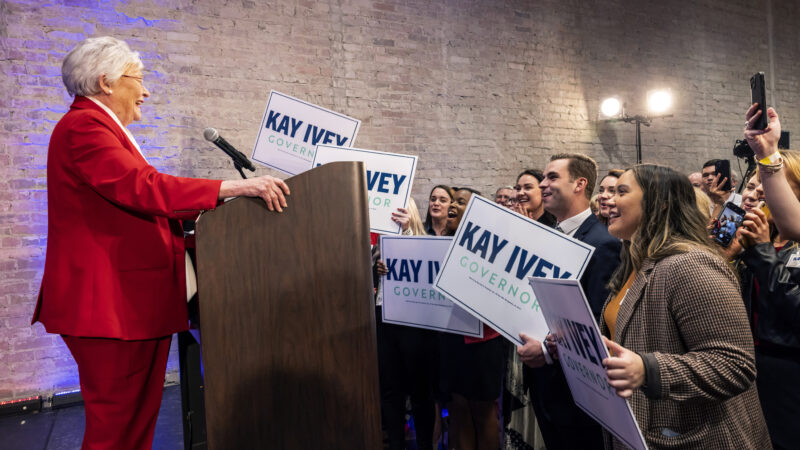Republican Kay Ivey wins 2nd full term as Alabama governor
Gov. Kay Ivey greets supporters at her election night watch party after Alabama voted in midterm elections, Tuesday, Nov. 8, 2022, in Montgomery, Ala.
By Jay Reeves, Associated Press
BIRMINGHAM, Ala. — Alabama Gov. Kay Ivey easily won a second full term Tuesday against Democrat Yolanda Flowers, the first Black woman to win a major party’s gubernatorial nomination in the state, after surviving both a health scare and multiple Republican challengers in the primary.
Smiling broadly and wearing a bright red jacket, Ivey took the stage before a huge American flag and waved to cheering supporters at a campaign celebration held at a restaurant in Montgomery.
“Y’all, we did it!” she exclaimed.
While Flowers’ candidacy was an interesting historical footnote, it posed no real threat to the GOP’s control of all three branches of government in a majority white, conservative state where voting patterns typically break down by skin color. Flowers closed her campaign with days of fasting and a lengthy prayer shown on Facebook.
Libertarian Jimmy Blake, a former Birmingham City Council member, also was on the ballot.
Ivey, who turned 78 in October, avoided a runoff in the spring despite facing a slate that included eight Republican challengers who forced her to the right. Ivey repeated former President Donald Trump’s lies about election theft and aired a campaign commercial in which she pulled a pistol out of her purse.
Following the primary, Ivey — who was diagnosed with early-stage lung cancer in 2019 and later said the disease was gone — was faced with questions about her health after she disappeared from public view for almost three weeks during the summer. She refused to say whether she underwent any medical treatment.
While Ivey’s absence made headlines, any doubts or concerns about her health didn’t have any effect on her chances of victory. At her party, a jubilant Ivey thanked voters.
“Folks, there’s no doubt that the best is yet to come because we all know there’s no step too high for a high stepper,” said Ivey, repeating a campaign mantra.
In her re-election bid, Ivey mostly ignored her opponents and instead touted the state’s low unemployment rate and opposition to the policies of Democratic President Joe Biden. She had a campaign bank balance of more than $200,000 at the end of September compared to just $546 for Flowers, records showed.
Ivey first became governor in April 2017, when she was elevated from the office of lieutenant governor following the resignation of Robert Bentley, who quit in a plea agreement following a scandal over his relationship with a female staffer. Ivey defeated an experienced, well-known Democratic challenger, Tuscaloosa Mayor Walt Maddox, by 20 percentage points in 2018 to claim her first full term.
Exclusive: Trump team withholds $140 million budgeted for fentanyl fight
Threats to $140 million in funds for public health departments battling fentanyl overdoses comes as some experts see the addiction safety net unraveling
10 years ago, a flood devastated this Texas town. The road to recovery has been long
Wimberley, Texas, was the site of a devastating flash flood on Memorial Day weekend in 2015. Now, 10 years later, the town has rebuilt with such floods in mind — but still feels the emotional effects.
Colombia deploys armed drones in escalating fight against drug gangs
In Colombia, drug gangs are waging a new kind of war — by air. Armed with cheap drones, they're targeting rivals in a dangerous escalation.
Do you want federal money for an EV or home solar? Time is running out — fast
Federal tax credits for rooftop solar, heat pumps and other energy-efficient technologies are going away at the end of the year. Here's what consumers should know.
In praise of the humble recorder — a gateway instrument for millions of schoolchildren
The small plastic instrument has long been the go-to instrument in elementary schools. But it is capable of so much more than "Hot Cross Buns."
Y’all, we need to talk about ‘y’all’
The word fills an important gap in our language, but it was once stigmatized. The story of "y'all" also includes powerful cultural forces, from hip-hop to ideas of welcoming inclusivity.









